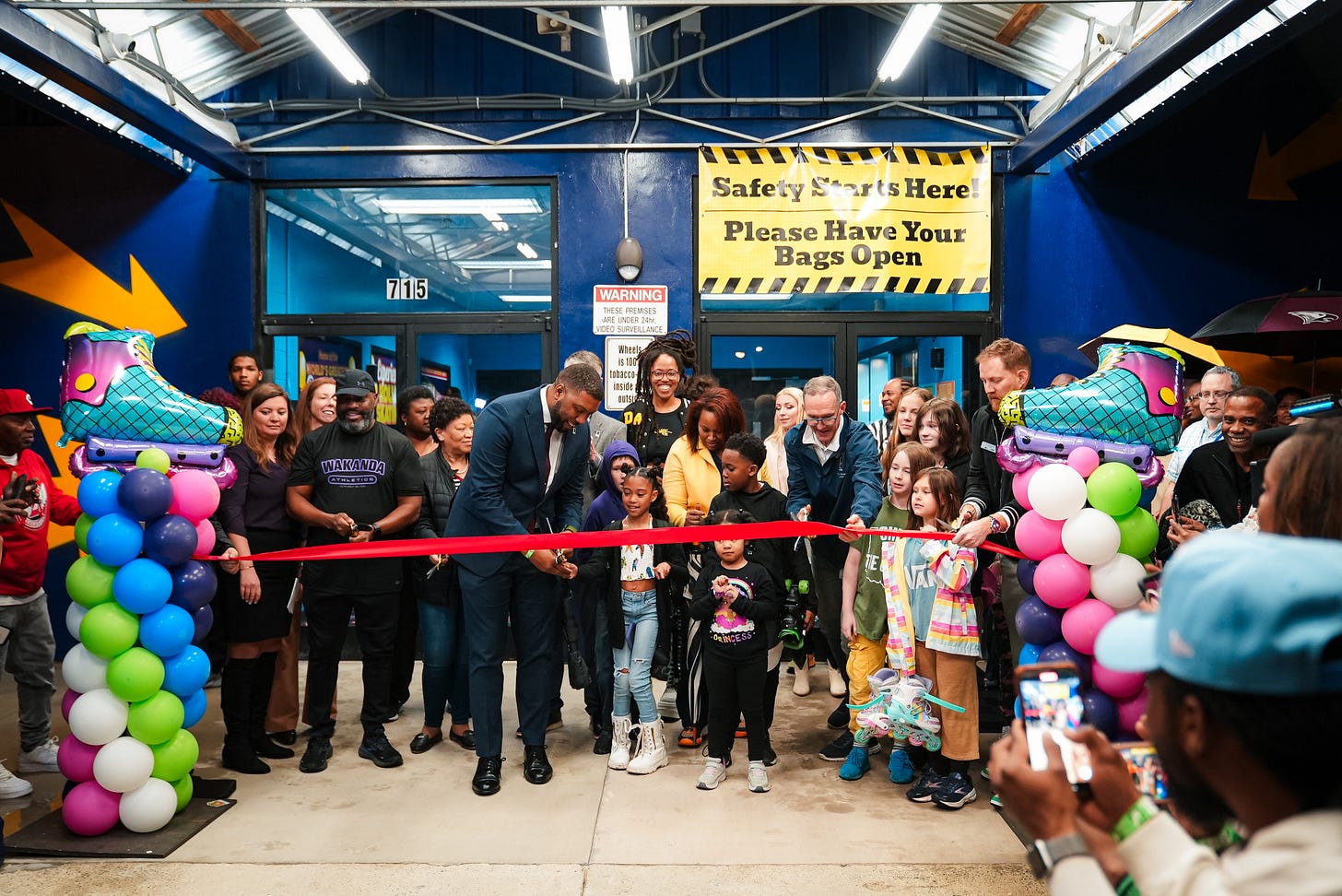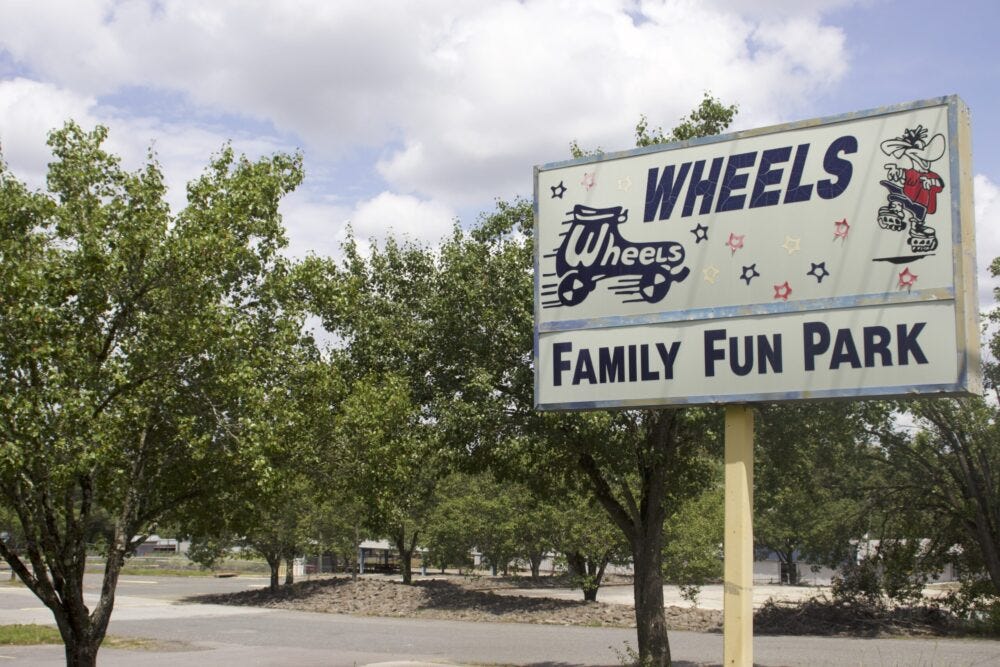A Promise Kept to the Bull City: Wheels Skating Rink is BACK!
“Tonight is about celebrating a promise kept.” These words from Durham’s new City Manager, Bo Ferguson, resonated with the 250+ attendees gathered for the grand opening of Wheels Durham, formerly known as Wheels Fun Park. Ferguson reflected on his own childhood memories of skating, recognizing the joy that skating rinks bring to communities. At the heart of his message was the City’s commitment to preserving cherished spaces and honoring the childhood memories of Durham residents.
Wheels has been one of Durham’s favorite recreational venues since its inception in 1977. The family owned and operated space included go-karts, mini-golf, and an indoor playground, becoming a central hub for family fun and community gatherings. The facility initially operated as a roller skating center in north Durham before relocating to the historic Merrick-Moore neighborhood in East Durham in March of 1992.
At the onset of Covid, in 2020, after four decades of operation, Wheels Fun Park closed its doors. In general, the pandemic caused a major destruction to the Roller Skating industry. From increased property value, high rental rates and reimagined family fun spaces like Urban Air and Defy Gravity, it has become a challenge for many rinks to stay afloat. In fact, prior to the re-opening of Wheels last week, United Skates Rink in Raleigh was the only operating rink in the Triangle. Not to mention, Charlotte, North Carolina’s largest city, also does not have a permanent skating rink.
The City of Durham purchased the eight-acre property in 2021, with plans to transform it into an aquatics center. Strong community advocacy highlighted the cultural and historical significance of the roller skating rink, leading city officials to keep the roller rink. With the help of the Wheels Roller Rink Residents Committee, Durham Parks and Recreation’s main goal was to ensure that the community's values and interests were represented in the redevelopment process.
After extensive renovations to meet modern safety codes and accessibility standards, the rink reopened on February 27, 2025 under the management of United Skates of America. The grand reopening featured a ribbon-cutting ceremony, appearances from Durham’s Mayor, Leonardo Williams, Durham Parks and Recreations Director, Wade Walcutt, a number of City Council Members and a public skate session to mark the return of a community staple.
After the grand opening and witnessing the communities response to both the upgraded space and the breathtaking artwork by award-winning sculptor/artist Dare Coulter, it is safe to say. . . Mission Completed.
“Skating rinks are sacred spaces,” Coulter shared in an interview. “People care about the memories they have in these spaces. And for some people, it’s not just about skating—it’s about safety. Wheels wasn’t just a place to skate; it was a place where you weren’t in trouble… where you weren’t in danger. This was a space of sacredness, of safety, of care—somewhere people could simply be good and have a good time. Considering that, I wanted to make sure the art felt like a joyful experience. I wanted the art to look like fun, to look like a beautiful moment that captures the peak feelings you could experience at a skating rink,” she added.
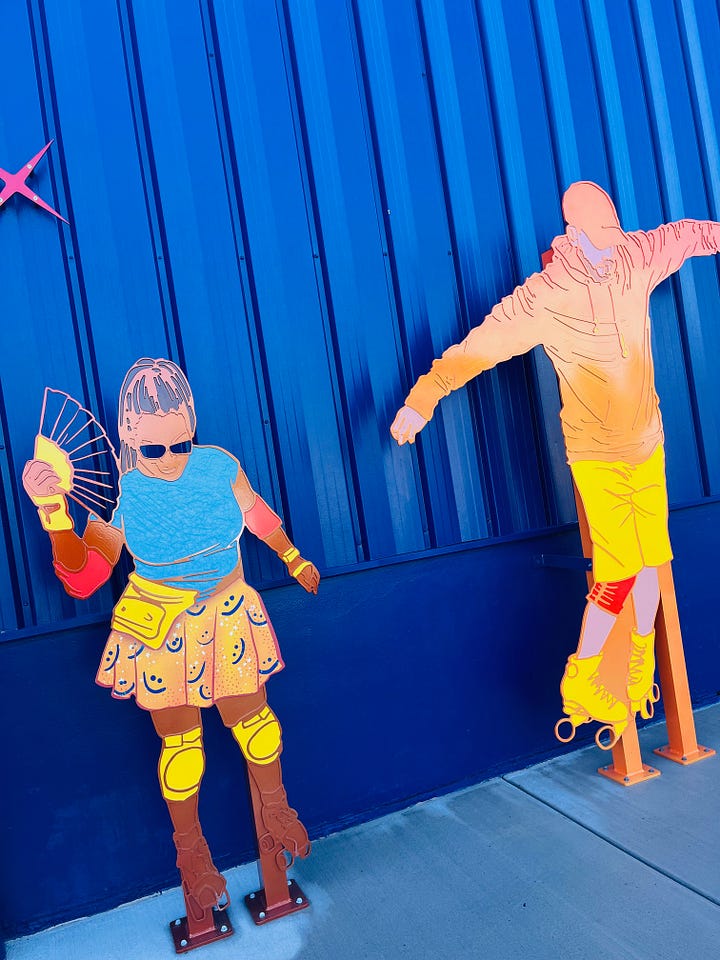

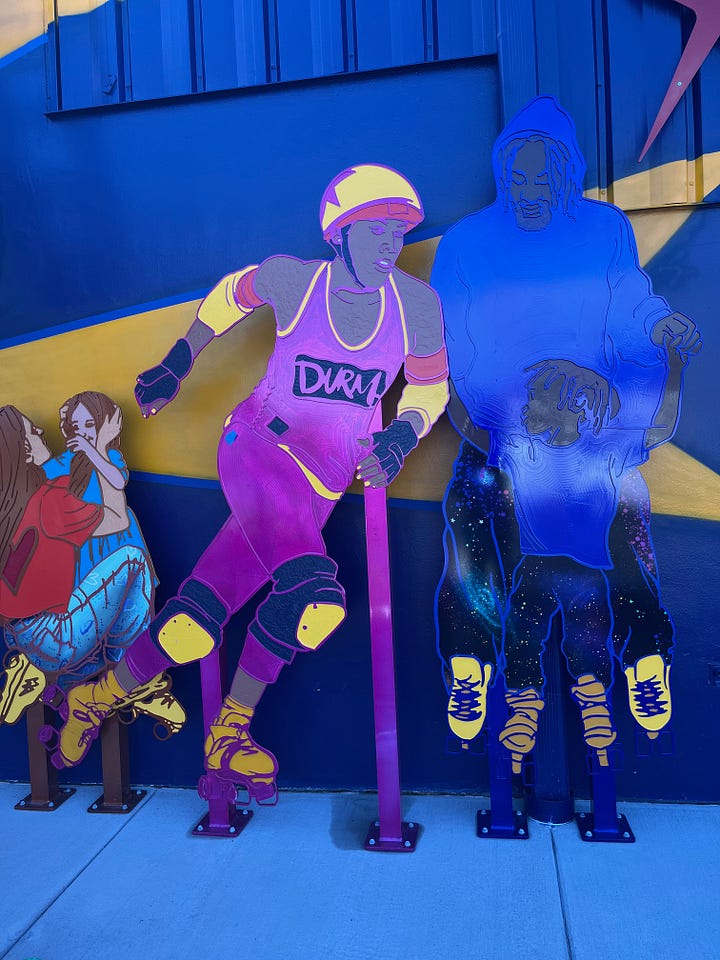
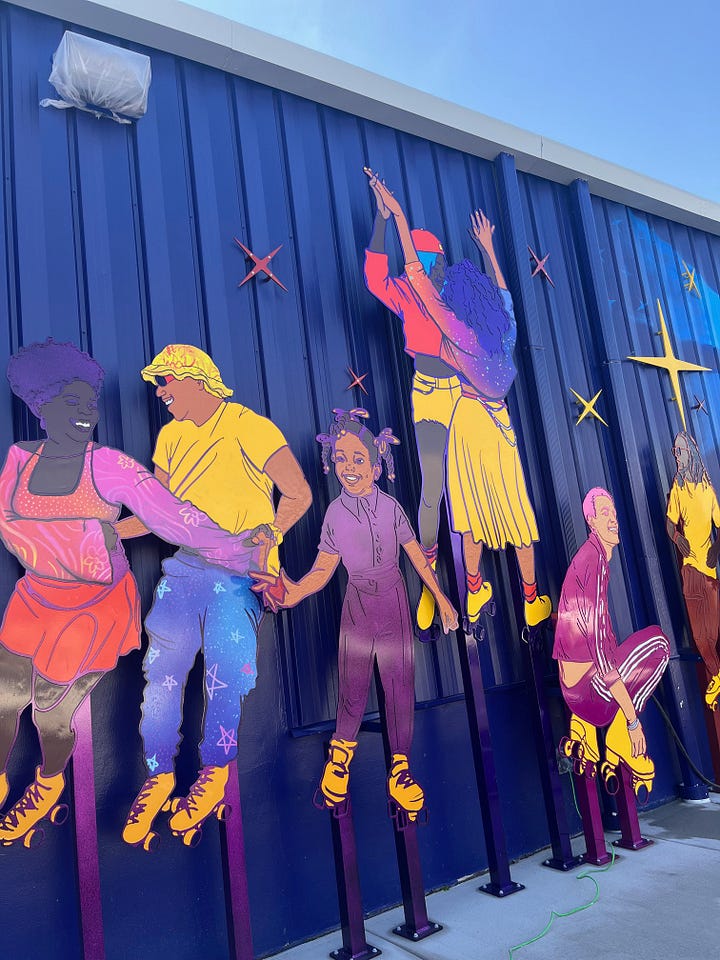
Splash & Play Project
Known as the Splash & Play Project, the project prioritizes consideration of the former Wheels Fun Park for the development of a large outdoor aquatics facility and other programming possibilities. City of Durham voters approved a bond during the November 2024 election allowing the City to borrow $85 million for a new Aquatic Center at Merrick-Moore Park and upgrades that include a new pool, play areas, athletic fields and courts, and other improvements to East End and Long Meadow Park, two neighborhood parks rooted in segregation. The Aquatic Center would be the newest and most inclusively designed public water park in Durham. Designed directly from our residents' feedback gathered through our Splash & Play Project, this park and multi-pool aquatic center will feature state-of-the-art design and fun features including zero-depth entry, a lazy river, and pool space for recreation swimming for all ages and abilities.

Black Roller Skating Culture
Roller skating rinks have long been cultural hubs in Black neighborhoods, serving as spaces for recreation, socialization, and artistic expression. During segregation, Black communities were often barred from white-owned skating rinks, leading to the establishment of Black-owned or Black-friendly rinks that became central gathering places. These rinks fostered a sense of community and resilience, providing a safe space where people of all ages could come together to skate, dance, and celebrate Black culture. Over time, roller skating evolved into an art form, deeply intertwined with Black music, fashion, and style—especially in cities where distinct regional skating styles emerged, such as Chicago’s JB skating or Atlanta’s ‘snap’ skating.
Beyond recreation, skating rinks have played a significant role in shaping Black music and dance culture. In the late 20th century, rinks were pivotal in the rise of hip-hop and R&B, often serving as venues for DJs and live performances. Many legendary artists, including Dr. Dre, Queen Latifah, and Usher, credit skating rinks as spaces where their music careers took shape. “In Black communities and Black Cultural spaces the skating rink also has a different space of importance because . . . you have Black performers who were able to be on stage in skating rinks long before they could hit the stages in segregated venues,” says artists Dare Coulter, acknowledging the importance of skating rinks for performing artists in general. Even today, rinks remain vital to the Black community, providing intergenerational connections and preserving cultural traditions. However, gentrification and economic challenges have led to the closure of many historic Black skating rinks, threatening these spaces that have been essential to Black joy and creativity.
Nestled in East Durham, in a historic neighborhood named after Durham trailblazers John Merrick and Aaron McDuffie Moore—founders of North Carolina Mutual—Wheels had long been recognized as a sacred space for Black residents. “People care about the memories they have in these spaces. And for some people, it’s not just about skating—it’s about safety. Wheels wasn’t just a place to skate; it was a place where you weren’t in trouble… where you weren’t in danger. This was a space of sacredness, of safety, of care—somewhere people could simply be good and have a good time." More than just a rink, Wheels was a place where Black culture thrived,” Dare Coulter shared. “95% of people told me this was a very Black space, and not just any Black space… it was aesthetically Black. . . from the clothing to the hair to the accessories. Showing up meant looking and feeling your best because it was a gathering spot, a community hub that carried deep meaning for those who spent time there.”
The push to preserve and revive skating rinks, such as Durham’s Wheels Roller Skating Rink, reflects a broader movement to maintain cultural landmarks that have long been pillars of Black neighborhoods.

The revitalized Wheels Roller Skating Rink now offers a state-of-the-art facility for skating enthusiasts of all ages, preserving its legacy as a vibrant part of Durham's recreational landscape. In a raving review of the grand opening, Indy Week staff writer and Durham native Lena Geller beautiful writes, “[Wheels] HGTV-worthy reno feels like . . .somebody took my childhood memories, ran them through the wash, and handed them back to me pristine.” She’s right—Durham, your childhood his back!



